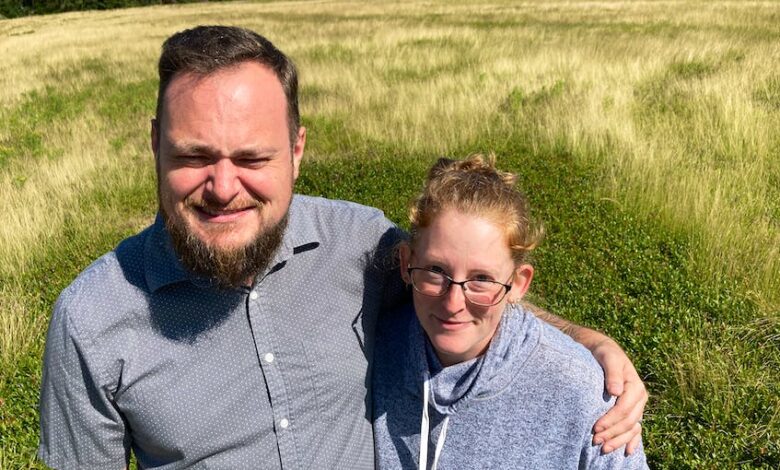One hard blueberry season in Earltown is no match for hard-working couple

EARLTOWN, N.S. — This valley has a role to play in the education of Chelsea and Tobias Colbourne.
“This year’s lesson is humility,” said Tobias on Tuesday.
A mass of frigid air came down from the Arctic in February and found the fields of Blueberry Moon Family Farm in Earltown bare. Without the insulating snow, buds were killed.
Then it poured through the critical three weeks when the surviving buds bloomed in late May and early June.
“The ladies can’t fly if it’s raining,” said Chelsea of her honeybees.
Then it kept raining all summer.
On Tuesday morning, the couple were watching their field dry, hoping to get out and harvest what they could of their crop.
It’s been a bad year for this province’s biggest agricultural export.
“It’s just miserable,” said Peter Burgess, executive director of the Wild Blueberry Producers Association of Nova Scotia, of the growing conditions.
The markets aren’t any better.
From about 76 cents a pound last year, the price to growers is down to around 40 cents so far and there are worries that it will drop to 30 cents.
The cost of production on Blueberry Moon Family Farm is 38 cents a pound.
Wild blueberries compete against every other processable fruit — namely the highbush blueberry and the European bilberry (which had a record crop last year) — enroute to 35 countries around the world.
Prices swing wildly, and Mother Nature has a whimsy all her own.
Two years ago, growers got $1.20 a pound but a few years before that they were getting 20 cents per pound.
It’s not an industry that lures capital or young people.
So the Colbournes are a rarity; they’re thirtysomethings who chose blueberry farming rather than being born into it.
Four years ago, they were living in Halifax with their two young children.
Chelsea looked at her husband and said, “You’re not happy in the city, are you?”
The pair grew up in the rural fishing communities of St. Anthony and St. Lunaire-Griquet, at the northern tip of Newfoundland’s Great Northern Peninsula.
They left, like most of their generation.
She studied philosophy first and then became an entomologist.
He did four years in the infantry and then nine as a hull tech in the navy before taking an early retirement.
His face gave Chelsea all the answer she needed.
“She said, ‘You’d better find a way to make it work then,’” remembered Tobias.

He’d been daydreaming of becoming a blueberry farmer.
It seemed like something he could figure out.
There was a 200-acre farm on a hill in Earltown with 50 acres of blueberries that had sat on the market in part because few wanted to buy a house with no cell service and lousy internet.
“I thought, ‘Well, that’s perfect for us,’” remembered Tobias.
So they moved to this valley in the Cobequid Hills.
While their first season was a bumper crop, the lessons piled on fast.
“You can’t rake 20 acres by hand,” said Chelsea.
“It doesn’t matter how good your intentions are, how hard you’re willing to work, you just can’t do it.”
The area’s older farmers, who’d been learning the ropes for decades, already knew this.
And as it happened, they weren’t going to let the young couple who brought big dreams and two children to Earltown fail.
“It was like they got together and said ‘OK, how do we get (Tobias and Chelsea’s) blueberries raked.’” said Tobias.
“Then they showed up. We’d have been lost without them.”
That community of older farmers are the mentors the Colbournes turn to with their many questions.
Meanwhile, their planning has borne some fruit. They’ve installed a processing line that allows them to directly sell a portion of their crop, mitigating the wild fluctuation in prices for those that go to processing. They’ve added a reefer trailer that will allow them to freeze their own berries and direct market throughout the year.
Chelsea’s entomology background has helped in pest identification, and she’s become a beekeeper.
Tobias has begun a plant sciences degree at the Dalhousie University Agricultural Campus in nearby Bible Hill.
It’s a life of learning they’re creating in front of their children.
“Since we came here, I’ve seen a work ethic in them that I never would have thought possible,” said Tobias of their daughter, Evelyn, and son, Tobias.
It’s only been two years.
This one’s been hard.
But they’re sticking around to see what else the valley has to teach them.



